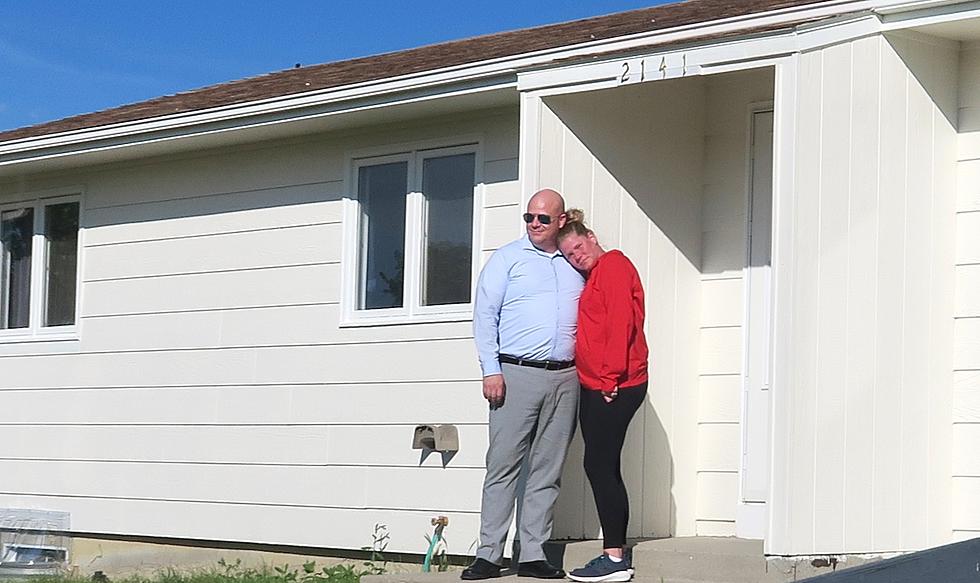
The Fall of the House on Thorndike (PHOTOS)
Last summer, Rebecca and Shawn Johnson bought what they believed would be their dream house for themselves and their three children: Remodeld with five bedrooms, new kitchen and appliances, three bathrooms, new paint and carpet, a finished basement and more.
A year later, they enter 2141 Thorndike Ave., in the Pratt No. 5 subdivision in south-central Casper; only they’re wearing hazmat suits.
"It's robbed us of everything," Rebecca said.
What started as a small discoloration on some trim downstairs devolved into discovering the basement had extensive water and foundation damage, a false floor to hide the water damage, and mold run wild creeping upstairs.
The Johnsons hired an architectural engineer, who after inspecting the house and finding that the kitchen floor was about to collapse, told them to leave.
In a couple of hours they packed, moved out in early April, and stayed with friends and in hotels until they found a nearby apartment at $2,000 a month.
The 1,500-square-foot house on the 7,500-square-foot lot is in foreclosure.
Their future is uncertain.
And they want to know what if any justice they may be able to find.
====================
The decline and fall of the house on Thorndike began on Nov. 30, 2016.
Local and federal law enforcement officers arrested Dr. Shakeel Kahn and his wife Lyn Kahn on a warrant charging them with one count of conspiracy to distribute oxycodone. They were indicted in January with more counts. (The Kahn’s bought the house built in 1980 in the name of his Arizona company Medicorp, Inc., in 2014, according to Natrona County Clerk records.)
Shakeel Kahn and his brother Nabeel "Sonny" Khan (the spellings are correct) went to trial in federal court in Casper starting on April 25, 2019. Lyn Kahn and all other defendants except Nabeel pleaded guilty before the trial began.
On May 24, the jury found Shakeel guilty on 21 counts and Nabeel guilty on two counts. U.S. District Court Judge Alan Johnson later sentenced Shakeel to 25 years imprisonment and Nabeel to 15 years imprisonment.
After a series of appeals, Shakeel’s case went to the U.S. Supreme Court, which in June 2022 sent the case back to the Denver-based 10th U.S. Circuit Court of Appeals, which sent it back to the Wyoming U.S. District Court over the question of when or if doctors legitimately prescribing painkillers shifted at some point to supporting clients’ addictions.
The estimated six-week jury retrial is scheduled to being Nov. 6.
Shortly after the May 2019 verdict, Judge Johnson granted the government’s request for a preliminary forfeiture order of property gained or used in the Kahns’ criminal activity. In August 2020, he issued the final order for the forfeiture of the house and other property, according to court records.
====================
The house built in 1980 became the property of the Internal Revenue Service until January 2022.
A spokesman for the IRS in Washington, D.C., said the IRS is required to sell the property at a public auction. Such auctions for forfeited real estate are rare, he said. The Thorndike house was the only property in Wyoming held by the IRS since early 2018, according to a U.S. Treasury website.
The IRS spokesman said he did not know if anyone visited the house to inspect it, determine whether anyone occupied it, or see if it was properly maintained.
But even if that happened and an inspector made notes about its condition, that information is confidential, he said.
However, Rebecca obtained a photo in the basement showing mold in the
underlay of the kitchen floor. That existed before Larry Muzzy and Eleanor Urbigkit Muzzy bought the house at a Natrona County Sheriff’s Office auction to for $146,900, according to County Clerk records.
Sheriff’s Office spokeswoman Kiera Grogan said the Office solely executes the sale for foreclosure auctions.
The buyer at the auction is responsible for conducting due diligence on the property, Grogan said.
====================
At some time in early 2022, Muzzy hired Daniel Ooka to renovate the house.
Ooka did not return four phone calls seeking comment.
According to the Casper City Clerk’s office, Ooka is a Class III General Contractor, whose license allows him to do small remodels or repairs such as one or two rooms in a home. His license does not allow him to do work on commercial properties.
Ooka’s Facebook page and voice message say he is the sole proprietor of his construction company called House Worx, created on July 3, 2021. However, no company by that name can be found on the Wyoming Secretary of State’s business search website.
The Municipal Code requires contractors to obtain building permits for their work.
The City Clerk’s Office says no permits were obtained for work on 2141 Thorndike Ave., in 2022.
Because Muzzy and/or Ooka obtained no permits, the City conducted no inspections.
In August, Broker One Real Estate of Casper posted a Matterport Discover 3D model of the renovated house. Broker One agent Greg Moline represented the Muzzys and declined to comment.
It shows a fine renovated middle-class house for a family of five.
Take the 3D tour of the house here.
Despite the appearance, the Johnsons say they did everything right before they bought the house, such as having their real estate agent, Dan White with the House Real Estate Group, hire a third-party inspector. White declined to comment.
==========================
The Johnsons married and blended their families -- Shawn with a boy and Rebecca with two girls -- in 2018.
Shawn is a Casper native who was a Natrona County Sheriff's deputy for 13 years and an Army combat medic for 21 years.
In 2014, he was elected from Ward 2 to the Casper City Council and resigned in August 2022 because of his move to the Thorndike address.
Shawn unsuccessfully ran on the Libertarian Party ticket for a Natrona County Commission seat in 2022.
He is finishing a law degree.
Rebecca was born in Thermopolis, moved to Houston where she graduated from high school, moved several other places and landed in Casper in 2012.
In March 2022, her brother, Ray Edwards, died by suicide in Texas.
In August, family members and others gathered in Casper for a memorial services.
They needed a place to stay, and the Johnsons were granted early occupation of the house before the scheduled Sept. 12 closing date.
On Sept. 11, she noticed paint discoloration on trim in a basement room, and from her experience knew that the cause probably was mold.
Meetings and calls with with real estate agents and the seller resulted in a demand by White to Muzzy to have the wall professionally fixed by the end of September, she said.
On Sept. 12, the Johnsons closed on the house, the same day they took out a 30-year $279,837 mortgage. Payments were $2,300 a month, Shawn Johnson said.
Several days later, Ooka stopped by the house to look at and remediate the mold, left her some over-the-counter household anti-mold sprays for bathrooms and left, Rebecca said. Ooka billed himself as a professional mold remediator, she added.
Ooka told her that Muzzy had hired him to remodel the house. He also told Rebecca that the job took longer than he thought it would in part because of "'issues,'" which he did not identify, she said.
Other than the minor if not ineffective mold remediation, little was done on the house in the following months.
However in December, Johnsons took their daughter, who was living in a basement bedroom, to Banner Health-Wyoming Medical Center for treatment for asthma, which she never had before, Rebecca said.
By February, the Johnsons learned more about the mold and water issues in the basement.
She hired a couple of local businesses to further look at the basement, and one of them reported that the carpet in the basement wasn't attached to the concrete floor, but rather on a 1-inch floor built over the concrete.
On March 7, another company started work on the basement by removing the 1-inch false floor and the drywall up to 4 feet on the walls.
Rebecca went home that day, saw what the company had discovered, and asked the company owner to stop. The owner said they needed to remove the rest of the drywall.
That work began on March 20 when, among other things, a floating wall with 2x4s built in front of and to cover the collapsing basement wall. That was the first time the Johnsons learned that. (The drywall in this part of the basement was attached to the floating wall otherwise the drywall would be been pushed out. In other parts of the basement where the wall was undamaged, thin furring strips were nailed into the concrete, and drywall was attached to them.)
All the drywall, most of which was covered in mold (Stachybotrys), was taken to the landfill.
However, the Johnsons saved several pieces of the drywall, which showed manufacturing dates including some in 2022.
Muzzy had told them that all the drywall was in place when he bought the house and he just had it painted over. (Finishing drywall requires a special kind of tape, but Ooka used duct tape, and then used masking tape when the duct tape ran out, Rebecca said.)
The removal of the drywall on the floating wall also revealed a window that had been covered, with the ground outside covered with concrete.
The Johnsons also hired architectural engineer David Little to look at the damage on the walls.
Little, owner of the Mills-based Iron Creek Designs who specializes in concrete and steel design, said the houses west of South Beverly Street near East 15th streets had a long history of foundation problems in part because of an aquifer.
The collapsing concrete probably began 10 years to 15 years ago, he said.
The damage is severe, he said. "That house should never have been sold."
Little did three inspections. During the first one, he found the center of the kitchen floor was about to collapse into the basement.
He said he told the Johnsons to find other living arrangements until the problems are resolved.
The Johnsons blame Muzzy for all that has happened.
When interviewed, Muzzy initially denied selling the house, then said the Johnsons rented it from him and occupied it a few weeks before closing. (Rebecca Johnson denied they rented it.)
Muzzy said inspections were conducted, saying they were "regular inspectors. When you sell a house inspectors have to go in and inspect that stuff."
He declined to identify those inspectors and hung up.
===========================
The Johnsons are at an impasse.
"I don't ever want anyone to endure and lose what we have lost and gone through," Rebecca said. "It's tried every area of our life, our marriage, our kids our job."
Their home insurance company cannot help because it determined the damage happened before they bought the house.
"We've had no help," she said. "It took months to even find an attorney that was willing to give us the time of day."
The foreclosure will damage their credit rating for years.
The Johnsons didn't qualify for any kind of government help because of their income.
They've called local furniture stores asking them if they could donate anything because they had to get rid of the furniture in the house. They rent the furniture they are using in their apartment.
They want to bring awareness to the community and anyone planning to buy a home.
They did everything right, and it still wasn't enough, she said. "We did our inspections; they passed."
Shawn added, "We want people to make sure that they are aware that this could happen to anybody."



